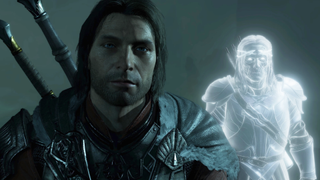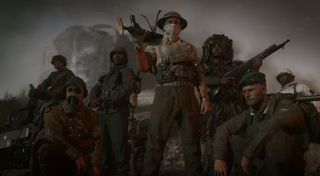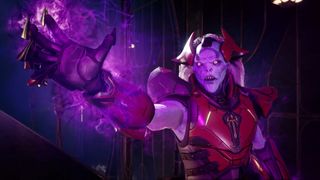THE LOWS

Tom Senior: Boredor
I’m disappointed to hear that Shadow of Mordor has committed the common sin of cluttering up the open world with tedious busywork. The first game had two things going for it: sharp, brutal combat, and the Nemesis system. The latter seems to have been expanded with even more ways to mess with Orcs, but you’re still playing as Aragorn-lite, a man so dull he needs to be haunted by a grumpy elf to liven things up. At least the loot boxes aren’t too intrusive.
I’m still going to play it though. It has been too long since I’ve chopped an Orc’s head off. I must remember to take a few moments before I begin to savour what remains of the credibility of JRR Tolkien’s fantasy universe. RIP.
Samuel Roberts: Micro-sadness
Did anything good happen this week in PC gaming? It was like stepping into a washing machine of swirling microtransactions, loot crates and VIP programs, between Forza 7 and Shadow of War. No doubt this isn't the sort of conversation that's going away anytime soon, and fair enough when you're being charged $60 upfront for these games. If publishers don't want this kind of drama around their games, they could choose not to include these elements that will obviously be contentious. They don't, though. At least Microsoft changed Forza's one after seeing the reaction.
Like Tom, I'm also pleased to hear that Shadow of War's crates didn't affect Andy's enjoyment of the many hours of the game he played for his review, unlike the more irritating open world bloat and bad storytelling. But still, how about you just don't include them at all in a primarily singleplayer game like this?

Tyler Wilde: Doing my duty
The biggest gaming news, reviews and hardware deals
Keep up to date with the most important stories and the best deals, as picked by the PC Gamer team.
It's been a long time since I've had as much fun in Call of Duty's multiplayer as I had during the CoD:WWII beta last weekend. I took predictable flak for saying so, but adjusting to the high-damage weapons and laned maps, which contrast with the new round of arena shooters I've been playing, was great fun. It felt similar to how Medal of Honor: Allied Assault contrasted with Quake 3 at the time.
I'm only down on it for the same reasons I've been disappointed by CoD before, and I wish I didn't have to caveat my enjoyment so much. Call of Duty is overpriced, for one thing. Even if I like this version more than the last few, it's still a $60 game with $40 worth of future DLC right off the bat with the Digital Deluxe edition, which always splinters the players, and makes me wish Day of Infamy and Rising Storm had more players. There were cheaters in the beta, too, which Sledgehammer says it'll deal with, but we'll see. The new War mode didn't stand out to me, and anyway Call of Duty's non-standard modes tend to be underpopulated on PC, to the extent that it's hard to find a match at all. And will we be able to run custom dedicated servers and use a server browser? Questionable. There's all that and more—such as the full progression system—to consider when CoD:WWII launches. I hope I can still say that it's fun when we get there.
Phil Savage: Port in a storm
This week, we published the first in a monthly magazine column about why making games is hard. Xalavier's exploration of the problems of porting garnered various comments, including from armchair experts, actual experts, people sympathetic to the mammoth job of supporting every possible hardware configuration, and people concerned that this was apologia for bad PC ports. That's not the case. Writing about why ports are difficult doesn't prevent us from criticising bad ports. The two aren't mutually exclusive, and we'll continue to warn of poor experiences—both in terms of performance and play.
To me, though, it's worth understanding the difficulties of the process. It's easy to take games for granted—as demonstrated by anyone who's called a developer lazy without realising how ludicrous an accusation that is. The difficulties are worth knowing, as it highlights the great work of those developers that bring quality ports to PC. Pretending that it's easy doesn't help anyone, and feeds into the unhelpfully adversarial, nuance-stripped nature of online 'discourse' around game development.

Tim Clark: You were the Chosen ones
They're all dead. The Hunter, the Warlock and the Assassin's smirking faces are now mounted in the Avenger's trophy room. All felled by my squad of over-levelled Hollywood stars in XCOM 2's mighty War of the Chosen expansion. Sure, we lost Naomi Watts (rest in peace, sweet Templar princess) and Colin Farrell (eh, I'm over it) in the run up to icing the Hunter, and Alison Brie has never been quite the same since the Assassin kidnapped her, but overall my A-listers are in good shape, bristling with the best armor and guns in the game. But me? I feel bereft.
The Chosen were such good antagonists that, now they're gone, I miss them deeply. Listening to the Advent Speaker's weaksauce bitching after another successful mission is no substitute for the delicious salt of the Chosen. Now, all that's left is the march towards the final set of story missions which I've already played. I still have the Archon King to track down from the Alien Hunters DLC, which is something I guess, but goddamn it I'm actually regretting offing those purple bastards too soon. How long do you think it'll be before Firaxis announces XCOM 3? Don't answer that. I don't want to be more depressed.
Jarred Walton: the numbers don't add up
In between testing Skylake-X processors a few weeks ago and Coffee Lake this past week, it's been one helluva year for benchmarking new hardware. I've also been running a series of performance analysis articles, thanks to MSI. Right now, I'm in the process of trying to get sensible numbers out of Forza Motorsport 7 and Shadow of Mordor. The latter isn't a problem, but Forza is all over the map.
The game has a built-in benchmark, which is usually a good sign. The problem is that running the same benchmark, repeatedly, on the same hardware, gives a huge amount of variance. If you like numbers and statistics--and you know I do!--I'm seeing standard deviations of 10 percent, and even 25 percent in some cases. Normally, my benchmark sequences are around one percent standard deviation. The GTX 1070 beats a GTX 1080 Ti at 1080p medium, and running the benchmark twelve times on RX Vega 64, the difference between the best and worst result is a whopping 60 percent. What am I supposed to do with data like that?
I'll have the full performance analysis up at some point, but I hope a patch can smooth things out. Also, note that the problems mostly occur when you're running settings and hardware that gets well above 60 fps. Sounds like a problem with consolitis, despite the Xbox Play Anywhere initiative.
The collective PC Gamer editorial team worked together to write this article. PC Gamer is the global authority on PC games—starting in 1993 with the magazine, and then in 2010 with this website you're currently reading. We have writers across the US, UK and Australia, who you can read about here.
Most Popular

